|
|
|
Sort Order |
|
|
|
Items / Page
|
|
|
|
|
|
|
| Srl | Item |
| 1 |
ID:
124472
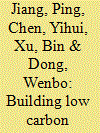

|
|
|
|
|
| Publication |
2013.
|
| Summary/Abstract |
Low carbon sustainability has been addressed in China's national development strategies. This research explores individual behaviour change and engagement in building low carbon communities in China through a case study looking at the building of a low carbon campus at Fudan University, Shanghai. Individual behaviour directly influences the overall energy consumption and carbon emissions on Fudan University's campus. Even though relevant polices have been issued for energy conservation, the energy consumption increased by 5% every year, which suggests that the "top-down" approach telling students and staff "what to do" does not work effectively. Based on a comprehensive method which includes the individual and social aspects related to the energy behaviour, the research analyses the promotion of individual engagement in building a low carbon campus through behaviour change based on four main aspects: (1) awareness raising and behaviour forming; (2) approaches to encourage behaviour change; (3) beyond the barriers and the constraints; and (4) systems and mechanisms for the long-term engagement. A low carbon management system is proposed for not only addressing management and technical solutions at the university level, but also based on the contributions from behaviour changes in establishing a low carbon campus at Fudan University at the individual level.
|
|
|
|
|
|
|
|
|
|
|
|
|
|
|
|
| 2 |
ID:
130442
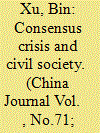

|
|
|
|
|
| Publication |
2014.
|
| Summary/Abstract |
Consensus crisis and civil society: the Sichuan earthquake response and state-society relations
A consensus crisis is characterized by challenges to the state's managerial capacity, a critical need for civil society's services, a general agreement on priorities and goals, and the state's efforts to construct a morally respectable image. These features amplify the structural conditions favorable for relatively amicable state-society interactions. Existing studies of social response to the 2008 Sichuan earthquake focus on state-society relations, but neglect the role of situations. I argue that the earthquake is an example of a consensus crisis, which provided civil associations with a situational opening of political opportunity.
|
|
|
|
|
|
|
|
|
|
|
|
|
|
|
|
| 3 |
ID:
153382
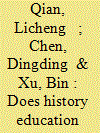

|
|
|
|
|
| Summary/Abstract |
Most studies of Chinese nationalism are based on an unstated and unexamined assumption that history education in Chinese schools can effectively instill the official memory of the anti-Japanese war into students. This article tests this assumption through a multi-method study based on a survey, a textual analysis and qualitative interviews with high school students and teachers. The findings show that history education (including both in-class and extracurricular forms) has limited effects on nationalism among Chinese high school students. The in-class textbook education is largely ineffective in forging nationalistic sentiments among students, whereas some extracurricular activities, such as visiting the ‘patriotic education bases’, have limited effects. The limited effects can be explained by four factors: (1) changes in the content and form of the new history textbooks; (2) the students’ and teachers’ actual uses of the textbooks; (3) the students’ cognitive and emotional agency in receiving history education; and (4) alternative information sources such as the media and family memory. This study contributes to the understanding of Chinese nationalism and historical memory by emphasizing the complexity involved in receiving official narratives.
|
|
|
|
|
|
|
|
|
|
|
|
|
|
|
|
| 4 |
ID:
192811
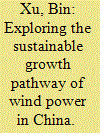

|
|
|
|
|
| Summary/Abstract |
China not only faces severe energy shortages, but also enormous pressure to reduce CO2 emissions. The objective of this article is to explore effective pathways and policies to promote wind power development in China. The interesting results include: (1) the impact of environmental regulations and green finance on wind power is nonlinear. Specifically, environmental regulations exert an inverted U-shaped impact in the central and eastern regions, and a U-shaped effect in the western region. (2) Green finance produces a U-shaped impact on wind power in the eastern region, and an N-shaped effect in the central and western regions. The impact of other economic factors shows a linear pattern. (3) Urbanization has the greatest impact on wind power in the central region, because of greater investment in technological talents and faster growth in high-tech industries. (4) Green technology innovation has made the greatest contribution to wind power in the western region, because of the rapidly growing green energy technology. (5) Financial decentralization has the smaller driving effect on wind power development in the eastern region, due to small financial investment. (6) Wind power prices have a driving effect on wind power development in the western region, but not played a driving role in the central and eastern regions. Finally, this article proposes promoting policies based on estimated results.
|
|
|
|
|
|
|
|
|
|
|
|
|
|
|
|
| 5 |
ID:
090797
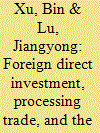

|
|
|
|
|
| Publication |
2009.
|
| Summary/Abstract |
China's export structure has shown a rapid shift towards more sophisticated industries. While some believe that this trend is a result of processing trade and foreign direct investment, the evidence is mixed. This paper examines variations in level of export sophistication across China's manufacturing industries. We find that an industry's level of export sophistication is positively related to the share of wholly foreign owned enterprises from OECD countries and the share of processing exports of foreign-invested enterprises, and negatively related to the share of processing exports of indigenous Chinese enterprises. Evidence from the relative export prices of Chinese goods, which measure within-product export sophistication, shows a similar pattern.
|
|
|
|
|
|
|
|
|
|
|
|
|
|
|
|
| 6 |
ID:
177371
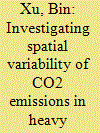

|
|
|
|
|
| Summary/Abstract |
China is now the world's largest carbon dioxide (CO2) emitter, and the government is under tremendous pressure to reduce CO2 emissions. The heavy industry sector is the largest contributor to the growth of CO2 emissions. Investigating the driving factors of this industry's CO2 emissions has important practical value. This paper applies the geographically weighted regression model to survey this industry's CO2 emissions. Empirical results show that urbanization exerts a heterogeneous impact on CO2 emissions across provinces and regions. This is mainly due to the differences in urban real estate and transportation infrastructure investments. Economic growth drives CO2 emissions, and this effect varies significantly by region and province on account of the differences in fixed-asset investment. It is more reasonable for local governments to develop emerging economies based on their specific conditions. Energy efficiency has the highest impact on CO2 emissions in the eastern region, because of the differences in R&D personnel investment and the number of patents granted. The energy consumption structure has the largest impact on CO2 emissions in the eastern region since it consumes more coal. Environmental regulations have a greater impact on CO2 emissions in the western region due to the differences in investment for industrial pollution control.
|
|
|
|
|
|
|
|
|
|
|
|
|
|
|
|
| 7 |
ID:
184088
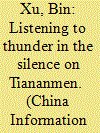

|
|
|
|
|
| Summary/Abstract |
‘Forgetting’ has been widely used in academic and public discourses of the memory of the 1989 Tiananmen Incident. The term, however, is conceptually unclear, empirically ineffective, and ethically problematic. Conceptually, it relies on a problematic assumption that silence means forgetting. Empirically, it lumps together different states of memory: ‘don’t remember, don’t talk about, don’t know, and don’t care.’ Ethically, it allows a broad, unjust moral accusation of those who remember but remain silent for various reasons. I argue that ‘silence’ provides greater conceptual precision, more analytical subtlety, and less ethical liability. Silence does not mean forgetting. Nor does it always mean the complete absence of sound. Rather, it refers to the absence of certain discourses about the past. I propose a perspective based on different forms of silence – ‘silencing, silenced, and silent’ – and illustrate it in an analysis of the memory of Tiananmen. Contrary to conventional wisdom, the analysis shows that the Chinese state initially intended to create a ‘covert silence’ – forcing people to remember rather than forget the official stories and silencing other narratives – and then an ‘overt silence’ in which all mention of the event was absent. Even underneath overt silence, however, are various experiences with ambiguities and nuances. The term silence also recognizes individuals’ ethical-political dilemmas under a repressive regime and aims to provide a language for an equal and inclusive truth-and-reconciliation process in the future.
|
|
|
|
|
|
|
|
|
|
|
|
|
|
|
|
| 8 |
ID:
146515
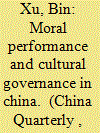

|
|
|
|
|
| Summary/Abstract |
This article examines the Chinese state's moral performance during several major disasters, including the 2008 Sichuan earthquake, the 1998 Yangtze River floods, and the 1976 Tangshan earthquake. Drawing on the theatrical theory of symbolic politics, I argue that the Sichuan earthquake marked a turn in the state's moral performance. While the Chinese state continued to project an image of a secure, heroic state, it endeavoured to construct a sympathetic image through leaders' displays of compassion and sorrow, a mourning ritual for ordinary victims, and narratives of response and rescue. This shift towards a more compassionate performance can be explained by the state's deployment of cultural resources to respond to societal challenges since the new millennium and its effort to repair its image amid the crises of 2008. The compassionate performance was temporarily effective because it found common ground with the traditional political culture of disaster, which still shapes the public's expectations of the state's moral conduct, and the new public culture that values equality and dignity of human life. Nevertheless, the political dilemmas of the compassionate performance became evident. Its efficacy largely relied on the presentation of suffering at the scene, which, however, led to public demands for the state to address the causes of the suffering. When the state failed to construct an “accountable state” image, this “dilemma of scene” had repercussions for its legitimacy. The efficacy of paternalism was also limited because it was less appealing to the growing urban middle class. By addressing moral performance, this paper contributes to the literature on politics of disaster and advances the important research agenda on cultural governance.
|
|
|
|
|
|
|
|
|
|
|
|
|
|
|
|
| 9 |
ID:
149893
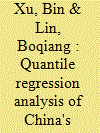

|
|
|
|
|
| Summary/Abstract |
China is already the largest carbon dioxide emitter in the world. This paper adopts provincial panel data from 1990 to 2014 and employs quantile regression model to investigate the influencing factors of China's CO2 emissions. The results show that economic growth plays a dominant role in the growth of CO2 emissions due to massive fixed–asset investment and export trade. The influences of energy intensity on the lower 10th and upper 90th quantile provinces are stronger than those in the 25th–50th quantile provinces because of big differences in R&D expenditure and human resources distribution. The impact of urbanization increases continuously from the lower 10th quantile provinces to the 10th–25th, 25th–50th, 50th–75th, 75th–90th and upper 90th quantile provinces, owing to the differences in R&D personnel, real estate development and motor–vehicle ownership. The effect of industrialization on the upper 90th quantile provinces is greater than those on other quantile provinces on account of the differences in the industrial scale and the development of the building industry. Thus, the heterogeneity effects of influencing factors on different quantile provinces should be taken into consideration when discussing the mitigation of CO2 emissions in China.
|
|
|
|
|
|
|
|
|
|
|
|
|
|
|
|
| 10 |
ID:
150391
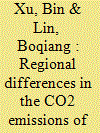

|
|
|
|
|
| Summary/Abstract |
Identifying the key influencing factors of CO2 emissions in China's iron and steel industry is vital for mitigating its emissions and formulating effective environmental protection measures. Most of the existing researches utilized time series data to investigate the driving factors of the industry's CO2 emission at the national level, but regional differences have not been given appropriate attention. This paper adopts provincial panel data from 2000 to 2013 and panel data models to examine the key driving forces of CO2 emissions at the regional levels in China. The results show that industrialization dominates the industry's CO2 emissions, but its effect varies across regions. The impact of energy efficiency on CO2 emissions in the eastern region is greater than in the central and western regions because of a huge difference in R&D investment. The influence of urbanization has significant regional differences due to the heterogeneity in human capital accumulation and real estate development. Energy structure has large potential to mitigate CO2 emissions on account of increased R&D investment in energy-saving technology and expanded clean energy use. Hence, in order to effectively achieve emission reduction, local governments should consider all these factors as well as regional heterogeneity in formulating appropriate mitigation policies.
|
|
|
|
|
|
|
|
|
|
|
|
|
|
|
|
|
|
|
|
|